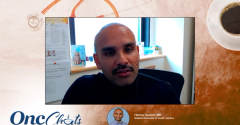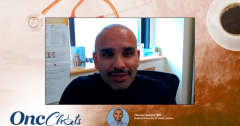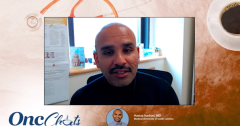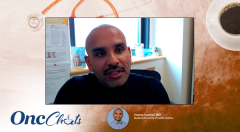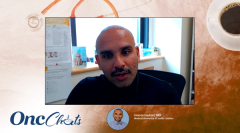
Unpacking Data From Pivotal Trials in Multiple Myeloma: Taking a Closer Look at Cilta-cel and CARTITUDE-1 Data
In this fourth episode of OncChats: Unpacking Data From Pivotal Trials in Multiple Myeloma, Hamza Hashmi, MD, explains the optimal use of CAR T-cell therapy and common symptoms of adverse effects, including cytokine release syndrome and immune effector cell–associated neurotoxicity syndrome in relapsed/refractory multiple myeloma.
Episodes in this series

In this fourth episode of OncChats: Unpacking Data From Pivotal Trials in Multiple Myeloma, Hamza Hashmi, MD, of the Medical University of South Carolina, explains the optimal use of CAR T-cell therapy and common symptoms of adverse effects, including cytokine release syndrome and immune effector cell–associated neurotoxicity syndrome in relapsed/refractory multiple myeloma.
The next trial that I will talk about is CARTITUDE-1 [NCT03548207], which is a phase 1/2 study evaluating ciltacabtagene autoleucel [Carvykti; cilta-cel] for patients with relapsed or refractory multiple myeloma. In this trial, patients who have had at least 3 prior lines of therapy were enrolled and given a single one-time infusion of cilta-cel, [which] is a BCMA-targeting CAR T-cell therapy, with a special feature of having 2 BCMA-binding domains on its antigen-binding site. Patients on this trial, on average, have had at least 6 prior lines of therapy. A vast majority [of patients] were refractory to an anti-CD38 monoclonal antibody, a proteasome inhibitor [PI], and an immunomodulatory drug [IMiD]. Moreover, the vast majority [also had] received a prior transplant. About 25% to 30% of the patients had extramedullary disease and high-risk cytogenetic abnormalities.
Once cilta-cel was given as a single one-time infusion, it led to some groundbreaking efficacy, with an overall response rate of 98%. The stringent complete remission [rate achieved with the therapy was] around 80%, and around 90% [of patients had] minimal residual disease negativity at 105. This depth of response very clearly translated to a very durable remission, as well. The median duration of response in this heavily pretreated patient population was around 24 months. Median progression-free survival, as well as overall survival, at the 2-year follow-up was not yet reached.
Cilta-cel does come at a cost of some treatment-related adverse effects, most notably cytokine release syndrome [CRS], which was seen in a vast majority of patients. One of the differences to highlight here between cilta-cel and idecabtagene vicleucel [Abecma; ide-cel] is that although CRS is common, the onset of CRS is around 7 days with cilta-cel vs around 1 day with ide-cel. Most patients [who received] cilta-cel experienced CRS after 4 days. [This toxicity] is managed in a very similar manner with tocilizumab [Actemra]. Having an onset of CRS after 72 hours of infusion does allow us to give this CAR T-cell product in the outpatient setting which sometimes translates into better financial reimbursement for this product.
Immune cell effector–associated neurotoxicity syndrome [ICANS] was seen in about 20% of the patients and about 10% of the patients experienced non-ICANS neurotoxicity, which mimicked Parkinson-like disease, with patients having cognitive impairment, shuffling gait, movement disorders, and tremors. In some of these patients, this neurotoxicity was not reversible.
In more recent trials with this construct, the recommendation has been to use bridging chemotherapy, early steroids, and more careful handwriting monitoring to be able to identify and mitigate this non-ICANS neurotoxicity. Cytopenias were common and prolonged, as [what has been seen with] ide-cel, and were managed with supportive care, as well as hypogammaglobulinemia.
Cilta-cel is another great option for patients with heavily pretreated, relapsed or refractory multiple myeloma and it is commercially approved for patients who have at least 4 prior lines of therapy, with prior exposure to an anti-CD38 monoclonal antibody, PI, and an IMiD. [Cilta-cel] is given as a single agent. One of the challenges that we have encountered is that the product is not currently available at all cancer centers [throughout] the country, so access is limited and perhaps will improve with time.
Check back next Wednesday for the final episode in this series.


